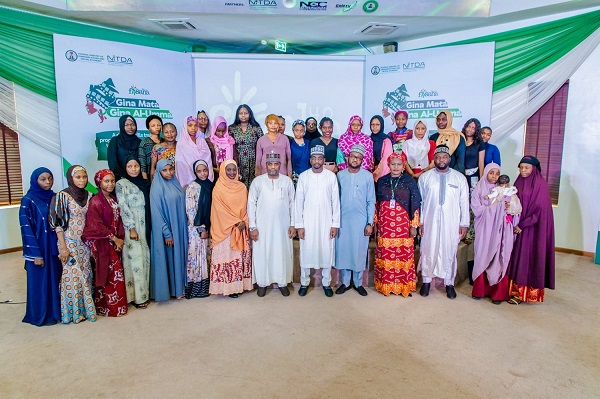
The director-general of the National Information Technology Development Agency (NITDA), Mallam Kashifu Abdullahi has revealed that empowering women in digital technology can add more than 50 per cent to Nigeria’s GDP in the next two years.
Speaking at the Fasaha Gina Matazu, Gina Al-Umma (“Building Women, Empowering Communities”) training programme organised by the World Bank in collaboration with NITDA and NatView Technology in Abuja, Abdullahi emphasised that gender parity and gender equality could add USD 229 billion to the Nigerian GDP by 2025.
The programme is designed to identify, prepare, and connect disadvantaged girls and young women with emerging skills in the knowledge economy. Abdullahi disclosed that NITDA is working on gender digital literacy and had trained 226,000 young Nigerians, but only 28 per cent of them were women. Therefore, NITDA is coming up with other initiatives specifically for women to increase their participation.
Abdullahi added that achieving gender parity and gender equality in Nigeria is critical to positioning the country to become a global challenge factory. He revealed that NITDA is working on various initiatives to achieve the National Digital Economy Policy and Strategy, including the national digital skills strategy that aims to achieve 95 per cent digital literacy.
“We aim to achieve 95 per cent digital literacy through initiatives like the national digital skills strategy, in partnership with the World Bank,” he said. “Nigeria can position itself as a global challenge factory and participate in the gig economy, leveraging the power of information technology. NITDA is working on gender digital literacy and plans to launch initiatives specifically for women, as their participation in current programs is below 30 per cent.”
The CEO of Natview Technology, Nuradean Maidokis said that the programme was part of their contribution to driving digital literacy and skills across Nigeria. The initiative aims to create a pipeline of highly skilled female technologists who can contribute to innovation and growth in Nigeria’s technology industry. The goal is to train and equip at least 800 girls and young women with digital skills and competencies to be globally competitive in the remote workplace.
During the four-day launch, 200 young women were selected to participate in a digital content creation training. The young women will receive skills training that will enable them to participate in the gig economy, creating a platform for them to earn income from home. Maidokis revealed that the initiative would deepen the partnership with the World Bank Group and NITDA.
“[These] 200 young women,” eh started, “have been selected for a 4-day digital content creation and skills training, with a focus on enabling their participation in the gig economy. The initiative aims to create a pipeline of skilled female technologists who can contribute to Nigeria’s tech industry, fostering diversity and inclusivity. The program’s goal is to train and equip 800 girls and young women to be globally competitive in remote work, starting with the pilot launch of 200 women focused on digital content creation and marketing. An additional 600 women from 4 high FCV states will be integrated in the future.”
The programme’s participants are expected to access education and job opportunities through digital skills, start their own businesses, reduce online gender-based violence and harassment, and promote gender equality. One of the trainees, Hajarah Mohammed, from Kano State, pledged that the knowledge they gained would enable them to make money from home, be more helpful to people in their country and not be liabilities.
In conclusion, the Fasaha Gina Matazu, Gina Al-Umma program is an excellent initiative that aims to bridge the gender gap in Nigeria’s digital technology sector. Empowering women with digital skills will not only increase Nigeria’s GDP but also create a more inclusive and diverse technology industry. The government and other stakeholders must support such initiatives to ensure that more women can participate in the digital economy.

